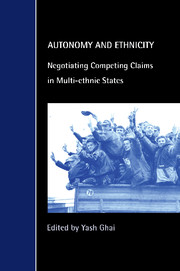Book contents
- Frontmatter
- Contents
- Acknowledgements
- List of Contributors
- 1 Ethnicity and Autonomy: A Framework for Analysis
- Part I Operating Autonomies
- Part II Failed Autonomies
- 7 Ethnicity and Federalism in Communist Yugoslavia and Its Successor States
- Part III Seeking Autonomies
- List of Cases
- List of Legislation
- Index
7 - Ethnicity and Federalism in Communist Yugoslavia and Its Successor States
Published online by Cambridge University Press: 06 July 2010
- Frontmatter
- Contents
- Acknowledgements
- List of Contributors
- 1 Ethnicity and Autonomy: A Framework for Analysis
- Part I Operating Autonomies
- Part II Failed Autonomies
- 7 Ethnicity and Federalism in Communist Yugoslavia and Its Successor States
- Part III Seeking Autonomies
- List of Cases
- List of Legislation
- Index
Summary
With the collapse of communist federations in the early 1990s, many scholars have questioned the value of federal arrangements for the maintenance of multi-ethnic societies. Some argue that federations give too much power to regions, which eventually leads to secession. For others, a federal arrangement is an insufficient form for the expression of regional and cultural differences and, consequently, it perpetuates internal conflicts and leads to disintegration of the federal state. However, federal arrangements per se are not necessarily good or bad. A great deal depends on the historical, political and social conditions of the particular society. What is crucial is the way in which the agreement between the constitutive units is reached. If the particular type of federal structure is imposed on the member states, it is more likely that the relationships between them will be a constant source of tension and conflict. If there are significant cultural and ethnic differences between the constitutive units, cultural questions will almost certainly become political questions which, in specific historical circumstances, can lead to collapse of the federal state.
Democratic constitutional arrangements do not define relationships between federal units once and for all, but provide for constant renegotiation and compromise. In the same vein, the ‘national question’ can never be resolved, as many communist governments claimed. Ethnic groups are prone to permanent re-evaluation of their position vis-à-vis other groups within the larger society.
- Type
- Chapter
- Information
- Autonomy and EthnicityNegotiating Competing Claims in Multi-Ethnic States, pp. 147 - 170Publisher: Cambridge University PressPrint publication year: 2000

